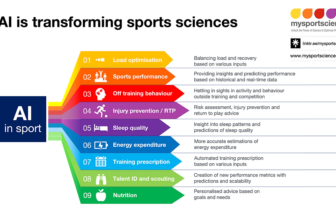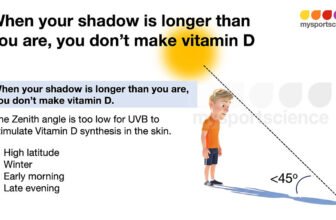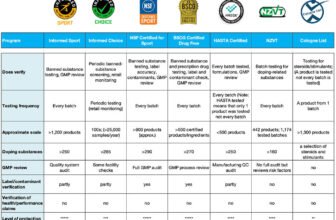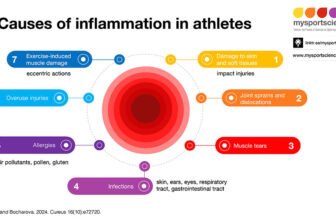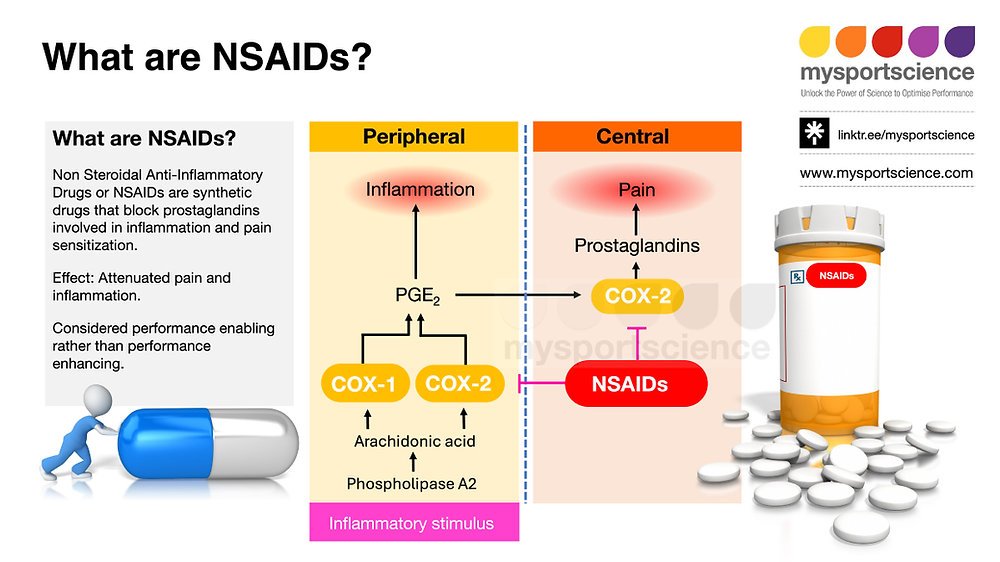
Non-steroidal anti-inflammatory medication, or NSAIDs, are a category of drug that’s generally used (worldwide) to cut back irritation and ache. As we are going to see within the subsequent weblog by Dr Nick Tiller, NSAIDs are additionally utilized in sport for efficiency causes. To know what NSAIDs are and the way they work, we have to have a fundamental understanding of the inflammatory response. This weblog outlines what NSAIDs are, how they work, and offers the idea of their use in sport.
Prostaglandin formation
Earlier than we discover the potential results of NSAIDs, we should first contemplate the mechanisms behind ache sensations. Following tissue harm or irritation, an enzyme referred to as phospholipase A2 is launched. This enzyme will convert phospholipids within the cell membrane into arachidonic acid. Arachidonic acid serves as a substrate for cyclooxygenase (COX) to type prostaglandins and these prostaglandins have numerous results on completely different organ methods.
COX enzymes
The COX enzyme exists in several varieties: COX-1 and COX-2. Under is an overview of every type:
-
COX-1: This isoform is expressed always all through the physique and is accountable for producing thromboxane and prostaglandins that stimulate regular physique capabilities. They’re, amongst different capabilities, accountable for the secretion of protecting gastric mucus, the regulation of gastric acid, the promotion of platelet aggregation (essential for blood clotting), and the upkeep of renal blood stream.
-
COX-2: This isoform is just not always expressed in most tissues. It’s induced regionally on the web site of harm or irritation. COX-2-helps the manufacturing of prostaglandins that mediate irritation, ache, and fever.
In abstract, these COX enzymes play an essential function in irritation and ache, but additionally in an entire host of different physiological capabilities.
How do NSAIDs work?
NSAIDs primarily act by inhibiting COX enzymes, resulting in decreased manufacturing of prostaglandins. Results are each central and peripheral, as proven within the graphic above. The decreased manufacturing of prostaglandins leads to anti-inflammatory and ache lowering/analgesic results. There are completely different classes of NSAIDs, some will particularly act on COX-1, some will solely work on COX-2 and a few are non-specific (will act on each). A standard NSAID is ibuprofen which is non-specific (impacts all COX enzymes). Whereas aspirin impacts particularly COX-1.
Adversarial results of NSAIDs
As one would count on, if COX enzymes are blocked, it’s not simply irritation and ache which can be affected however all different regular perform can be inhibited too. Inhibition of all these different results can have damaging penalties. In recent times these penalties have turn into higher understood, and there’s an growing variety of research on toxicity. As a result of this understanding, healthcare practitioners are actually rather more cautious with prescribing NSAIDs. Under we are going to talk about a few of the reported damaging results.
Gastrointestinal results
The commonest hostile results of NSAIDs are noticed within the gastrointestinal tract. Usually COX-1 will increase the synthesis of prostaglandin E2 (PGE2) in addition to prostacyclin (PGI2). Each play essential roles within the manufacturing of protecting mucus and regulating of blood stream to the intestine. It has been reported that inhibition of COX-1 will increase the chance of gastrointestinal bleeding and peptic ulcers, significantly with brokers which can be extra selective for COX-1 and particularly when utilized in excessive doses.
Antiplatelet results
Inhibition of COX-1 additionally impacts thromboxane A2 (TXA2) manufacturing, which promotes platelet aggregation and has implications for blood clotting. A lower in TXA2 formation leads to an antiplatelet impact which in flip will increase the chance of bleeding. Aspirin is especially identified for this impact because it irreversibly inhibits COX-1 in platelets, resulting in extended antiplatelet results even after the treatment is stopped.
Renal results
NSAIDs may influence kidney perform. Renal prostaglandins play and essential function in sustaining glomerular filtration charge (GFR). In compromised kidney perform, reminiscent of in coronary heart failure or previous age, the manufacturing of prostaglandins turns into a key issue for preserving renal blood stream. Particularly in these sufferers, NSAIDs might enhance the chance of kidney harm by suppressing renal prostaglandin manufacturing.
Cardiovascular results
Whereas brokers like aspirin can have protecting cardiovascular results as a result of their antiplatelet properties, medication with excessive COX-2 selectivity might enhance the chance of cardiovascular occasions. This happens as a result of selective inhibition of COX-2 can tip the stability in favour of TXA2 formation, resulting in elevated vasoconstriction and platelet aggregation, which raises the chance of myocardial infarction and stroke.
Abstract
In abstract, understanding the pharmacology of NSAIDs is essential for his or her efficient use in managing irritation and ache. Whereas NSAIDs present vital therapeutic advantages, additionally they carry dangers that should be fastidiously thought-about, significantly relating to gastrointestinal, antiplatelet, renal, and cardiovascular well being. Within the subsequent weblog we talk about whether or not NSAIDs ought to be used to help efficiency in a sports activities setting.
Trending Merchandise

